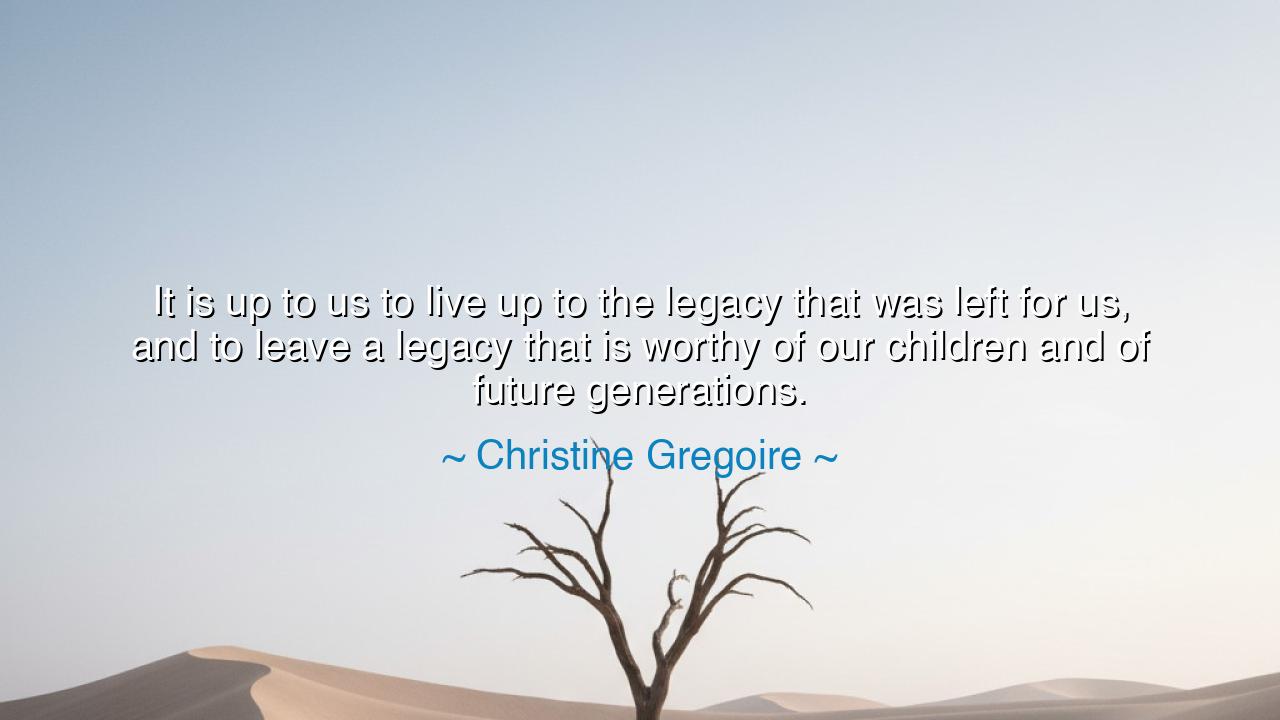
It is up to us to live up to the legacy that was left for us, and
It is up to us to live up to the legacy that was left for us, and to leave a legacy that is worthy of our children and of future generations.






"It is up to us to live up to the legacy that was left for us, and to leave a legacy that is worthy of our children and of future generations." These powerful words by Christine Gregoire call us to a higher purpose, reminding us that legacy is not just something we inherit, but something we are responsible for shaping and passing on. Our actions today are not only a reflection of the past, but also the foundation upon which the future will stand. The weight of this responsibility is profound: we are the stewards of the legacy we inherit, and it is our duty to ensure that the world we leave behind is one that future generations will be proud to inherit.
In the ancient world, the concept of legacy was central to every culture. The Greeks, in particular, believed that a person’s actions, whether virtuous or vile, were their legacy—and it was this legacy that would be remembered for all time. In Homer’s epic, The Iliad, the hero Achilles is consumed by the desire to create a legacy that will live on in the songs and stories of future generations. His pursuit of honor and glory on the battlefield is driven by the belief that his name must be etched into the fabric of history, a name that would outlast his lifetime. However, Achilles’ tragic flaw was that he sought to secure his legacy through violence, and in the end, his legacy was one of bloodshed and loss. The ancients understood that one’s legacy could be both a blessing and a curse, depending on the choices one made.
Gregoire’s call to live up to the legacy left to us, and to create one that is worthy of those who come after us, speaks to the understanding that legacy is not always about seeking fame or glory. It is about the impact we leave on the world, on the lives of those around us, and on the future we help to shape. In this way, it is similar to the idea of moral inheritance in ancient cultures. The Romans, for example, believed that the virtue of a man was passed down through the generations, not through wealth or physical possessions, but through the moral example set by the patriarchs of the family. Cicero wrote extensively about the importance of virtue in public and private life, believing that true legacy was not about wealth, but about leaving a world better than we found it—a world built on honor, duty, and service to others.
Consider the example of Mahatma Gandhi, who lived and died not seeking to create a legacy of power or personal acclaim, but one of peace, freedom, and justice for his people. Gandhi’s legacy was not written in wealth or military victory, but in his dedication to truth and his ability to inspire change through non-violence. Like the great philosophers and leaders of ancient times, Gandhi understood that true greatness lies in the way we serve others, in how we shape the world for the betterment of those who will come after us. His life was a testimony to the idea that our actions today build the future, and that the legacy we leave behind should be one of compassion, wisdom, and integrity.
Gregoire’s challenge to us is not just about creating a legacy for ourselves, but for those who will follow. Legacy, in this sense, is not just about personal achievement, but about the greater good we contribute to the world. Plato spoke of the philosopher-king, an ideal ruler who would govern not for his own benefit, but for the benefit of the people and the future generations. This echoes Gregoire’s sentiment: the true measure of our legacy lies not in how much we acquire or achieve in our lifetimes, but in the values we impart and the world we shape for those who come after us.
The lesson from Gregoire’s words, and from the teachings of the ancients, is clear: legacy is not just what we inherit, but what we create and pass down. Our lives are not only shaped by the history that came before us, but by the choices we make today. We must live in a way that ensures we leave behind a world worthy of those who will follow us. This does not mean we must seek greatness in the traditional sense, but that we must live with purpose, integrity, and compassion. Every small action taken in the spirit of love, honor, and justice contributes to the legacy we leave behind.
In practical terms, this means living with a sense of responsibility—not only for our own actions but for the impact they have on the world. It means thinking about the future in every decision we make, ensuring that the legacy we leave behind is one that enhances the world for our children and future generations. It is through our choices—the way we live, the way we treat others, the values we uphold—that we write the story of our legacy. Let us live in a way that reflects not just our hopes for the present, but our dreams for the future, ensuring that when we are gone, our legacy will be a beacon of light guiding those who come after us toward a better world.






AAdministratorAdministrator
Welcome, honored guests. Please leave a comment, we will respond soon